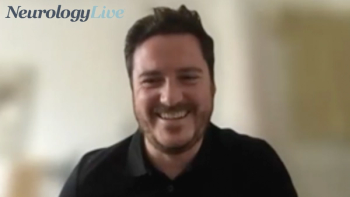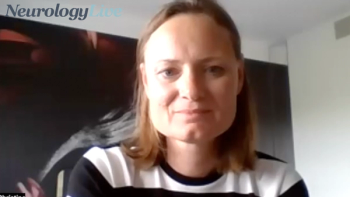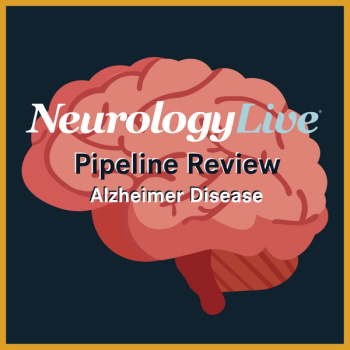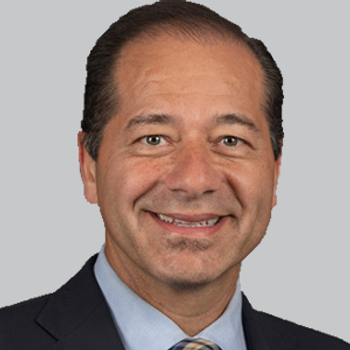
A slowing of disease progression by 30% would result in clearly meaningful differences in patients with mild cognitive impairment and mild dementia.

A slowing of disease progression by 30% would result in clearly meaningful differences in patients with mild cognitive impairment and mild dementia.

The postdoctoral researcher at The University of Texas Health Science Center at San Antonio talked the gut microbiome and neurological disorders, focusing on the potential role of gut microbiota imbalance in the pathogenesis of conditions like Alzheimer disease. [WATCH TIME: 5 minutes]

The clinical research associate at the University of Texas Health Science Center at San Antonio discussed a study that explores the relationship between cognitive function and gut microbiome structure in middle-aged adults from the Framingham Heart Study cohort. [WATCH TIME: 4 minutes]

The researcher in the department of neurochemistry at the University of Gothenburg in Sweden discussed bloodspot cards as a promising method for collecting blood samples in Alzheimer disease research. [WATCH TIME: 4 minutes]

The genetic epidemiologist at the University of Pennsylvania talked about a collaboration of sites and analysis groups across the US to create a vast collection of genetic data on patients living with Alzheimer disease. [WATCH TIME: 5 minutes]

Li-San Wang, PhD, the Peter C. Nowell, MD, professor of pathology and laboratory medicine, Perelman School of Medicine at the University of Pennsylvania, discussed a study that aims to address the underrepresentation of Asian populations in Alzheimer disease research.

The associate professor of neuroscience at Lund University in Sweden discussed findings from a study of a new blood test examining biomarkers which demonstrated a high accuracy in identifying Alzheimer disease pathology. [WATCH TIME: 5 minutes]

The research assistant professor, pathology and laboratory medicine, University of Pennsylvania, talked about the ongoing research in her lab on understanding the mechanisms and consequences of TDP-43 aggregation in Alzheimer Disease. [WATCH TIME: 4 minutes]

Several patients have completed the 18-month trial and have moved on to the open-label extension, where they will be followed for an additional 12 months.

The associate professor of neurochemistry at the University of Gothenburg in Sweden talked about a pilot study that explored the potential of finger prick tests to remotely collect blood and provide reliable biomarker results for Alzheimer disease diagnosis. [WATCH TIME: 5 minutes]

The director of research for internal medicine and geriatrics at Indiana University School of Medicine provided perspective on ways to effectively streamline cognitive screening in timely and accurate manor. [WATCH TIME: 4 minutes]

In total, 33% of the study participants died within 180 days after initiating their first opioid prescription, compared with 6.4% of those unexposed.

Chaoran Ma, MD, PhD, assistant professor at University of Massachusetts Amherst, talked about the association between bowel movement frequency, the gut microbiome, and cognitive function in patients living with dementia.

The neurologist in the Danish Dementia Research Center at Rigshospitalet in Copenhagen, Denmark, discussed a cohort study that examined the association between opioid use and the risk of mortality in an older patient population living with dementia. [WATCH TIME: 5 minutes]

Change in phosphorylated tau231, the primary outcome, favored nicotinamide despite not reaching statistical significance.

With the recent approval of lecanemab (Leqembi; Eisai), NeurologyLive took a closer look at the Alzheimer pipeline, and the potential agents clinicians should keep an eye on in the coming years.

Using a cohort of more than 600 cognitively normal adults, the MIND diet failed to outperform a control diet of mild caloric restriction on several outcomes, including cognition and hippocampal volumes.

The professor in the department of internal medicine at RUSH Medical College talked about estimating the prevalence of Alzheimer disease to uncover the variability in disease prevalence at a micro-level and its implications for public health programs. [WATCH TIME: 5 minutes]

The associate professor of neurology at the Indiana University School of Medicine provided commentary on a study comparing traditional cognitive screening methods and the Linus Health Digital Clock and Recall test.

In a cohort of nearly 800 frail adults and elderly patients with neuropsychiatric symptoms, pimavanserin showed similar rates of treatment-related adverse events and discontinuations because of TEAEs to placebo.

The clinical relevance of donanemab was demonstrated through a slowing of clinical decline, stability of clinical symptoms, lowered risk of advancement to next clinical stage, and lower risk of meaningful within-patient change.

The associate professor of neurology at the Indiana University School of Medicine provided insight on the distinguishable characteristics of certain cognitive screening tools and the advantages to each. [WATCH TIME: 3 minutes]

The director of research for internal medicine and geriatrics at Indiana University School of Medicine provided perspective on navigating challenges with newly approved treatments for Alzheimer disease, and using resources efficiently. [WATCH TIME: 5 minutes]

A comparison between impaired scores on Digital Clock and Recall and impaired scores on Montreal Cognitive Assessment produced a 76% concordance.

According to diary data, caregiver's perceived reciprocity showed a substantial direct influence on the occurrence of behavioral symptoms on both the current day and the subsequent day for patients with Alzheimer disease and related dementias.

The postdoctoral fellow at the University of California San Diego discussed using CRISPR-based gene editing to alter the amyloid precursor protein gene in mice models with symptoms of Alzheimer disease. [WATCH TIME: 5 minutes]

Test your neurology knowledge with NeurologyLive®'s weekly quiz series, featuring questions on a variety of clinical and historical neurology topics. This week's topic is the history of the Alzheimer's Association.

Darina Petrovsky, PhD, RN, assistant professor, Rutgers University, spoke about her current study focused on developing a music-based application for people with dementia and their caregivers who have trouble sleeping.

The composite score, which consisted of 6 linguistic features and 3 acoustic features, was shown to be sensitive to measures of disease progression, with a potential to help understand treatment response.

The molecular biologist at the Cleveland Clinic Lerner Research Institute discussed the unanswered questions regarding biomarkers sTREM2 and GFAP, and the role they play in Alzheimer pathology.